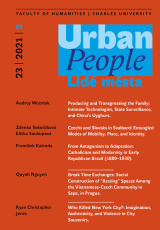Czechs and Slovaks in Svalbard
Entangled Modes of Mobility, Place, and Identity
DOI:
https://doi.org/10.14712/12128112.2368Klíčová slova:
Svalbard, Czechs, Slovaks, mobility, identity, tourism, placeAbstrakt
The article is an anthropological study of how Czech and Slovak nationals reflect on their lives, work, and explorations in Svalbard. We ask what kind of Czech and Slovak “presence” in Svalbard can be documented ethnographically, and what can we learn from people’s stories about the context in which their lives unfold. We profile four people as representing modes of relating to Svalbard (the globetrotter, the home-seeker, the pragmatist, and the sportsman), and complement this with a summary of findings distilled from the data created through various methods. Pre–COVID-19 pandemic, there were a few hundred Czechs and Slovaks who travelled to Svalbard every year, thanks to its accessibility, but also because of other reasons: research, tourism, and employment in the service industry. In line with studies contesting delineated identities such as “tourists” or “researchers”, we discuss factors resulting in practical repercussions of visiting and/or settling in Svalbard. Citizenship and residential status, type of employer and work contract, and language competence have implications regarding the living possibilities and personal rights of Czechs and Slovaks in Svalbard. Mapping ethnographically the lives of these people in Svalbard confirms some findings of earlier studies on tourism, transnational identity, and lifestyle mobility. Czechs and Slovaks come to Svalbard attracted by the place’s appeal, which ranges from the Arctic environment and adventure, through tempting job opportunities, to establishing a potential “home” there. Relatively young, educated, skilled, and affluent Czechs and Slovaks in Svalbard develop notions of place and identity shaped both by global processes and local specificities.
Stahování
Publikováno
Jak citovat
Číslo
Sekce
Licence
Copyright (c) 2022 Zdenka Sokolíčková, Eliška Soukupová

Tato práce je licencována pod Mezinárodní licencí Creative Commons Attribution 4.0 .


